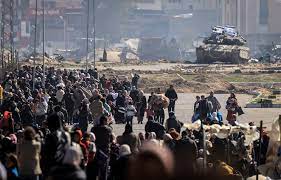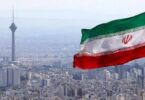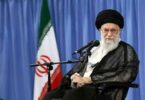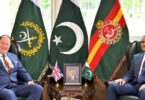GAZA STRIP, Palestinian Territories (AFP): Intense fighting raged Saturday in the Gaza city of Khan Yunis, the main theater of conflict where the Israeli army is targeting the Palestinian Islamist militant group Hamas.
The unabated hostilities came a day after the UN’s International Court of Justice in The Hague ruled that Israel must prevent possible acts of genocide in the conflict but stopped short of calling for a ceasefire.
Tensions rose between Israel and the UN agency for Palestinian refugees after Israel charged that several UNRWA staff were involved in the Hamas attacks of October 7, leading some key donor countries to suspend funding.
Foreign Minister Israel Katz said Saturday that Israel wants to ensure the UN agency, with tens of thousands of staff in Gaza, “will not be a part of the day after” the bloodiest ever Gaza war.
Alarm has grown over the plight of civilians in Khan Yunis, the southern hometown of Hamas’s Gaza chief Yahya Sinwar, the suspected mastermind of the October 7 attacks.
Witnesses reported more fierce fighting Saturday in the city, where the health ministry of the Hamas-run territory said “135 martyrs arrived at hospitals due to massacres throughout the night.”
The Hamas government’s press office reported “massive tank bombardment since the morning” targeting a refugee camp and the Nasser hospital.
Gaza civil defense spokesman Mahmud Bassal said tens of thousands, including children, endured a night of incessant and cold rain.
The harsh weather threatened to cause the “spread of contagious diseases” and made the “humanitarian crisis worse for the two million displaced across the strip,” he said.
Suhaila Asfur, a displaced woman, said her family was unable to sleep because of the heavy rain and said: “I don’t know what we will do tonight and where we will sleep.”
Issuing a highly anticipated ruling on Friday, the UN’s top court said Israel must prevent genocidal acts in Gaza and allow humanitarian aid into the narrow strip of land, which has been under relentless bombardment and siege for almost four months.
Israeli Prime Minister Benjamin Netanyahu rejected the case as “outrageous” while Gaza’s Hamas rulers hailed the ruling, saying it “contributes to isolating Israel and exposing its crimes in Gaza.”
The decision was based on an urgent application brought by South Africa, long a supporter of the Palestinian cause, but a broader judgment on whether genocide has been committed could take years.
“This is the first time the world has told Israel that it is out of line,” said Maha Yasin, a 42-year-old displaced Gaza woman.
“What Israel did to us in Gaza for four months has never happened in history.”
Israel’s military campaign began soon after Hamas’s unprecedented October 7 attacks that resulted in about 1,140 deaths in Israel, mostly civilians, according to an AFP tally of official Israeli figures.
Militants also seized about 250 hostages and Israel says around 132 of them remain in Gaza, including the bodies of at least 28 dead captives.
Israel has vowed to crush Hamas and Gaza’s health ministry says the Israeli military offensive has killed at least 26,257 people, about 70 percent of them women and children.
The army says at least 220 soldiers have been killed since Israel launched its Gaza ground operations.
With a humanitarian crisis growing, the UN says most of the estimated 1.7 million Palestinians displaced by the war are crowded into Rafah on the southern border with Egypt.
At Khan Yunis’s Nasser Hospital, the largest in the besieged city, Doctors Without Borders (MSF) said surgical capacity was “virtually non-existent.”
The charity said medical services at the hospital had “collapsed” and the few staff who remained “must contend with very low supplies that are insufficient to handle mass casualty events.”
World Health Organization chief Tedros Adhanom Ghebreyesus said 350 patients and 5,000 displaced people remained at the hospital as fighting continued nearby.
The Palestinian Red Crescent Society said Israeli tanks targeted the Al-Amal hospital, another of the few remaining medical facilities in Khan Yunis, and that it was “under siege with heavy gunfire.”
“There is no longer a health care system in Gaza,” MSF said.
There were 300 to 500 patients trapped at the Nasser hospital with “war-related injuries such as open wounds, lacerations from explosions, fractures and burns.”
The Israeli military accuses Hamas of operating from tunnels under hospitals in Gaza and of using the medical facilities as command centers.
Meirav Eilon Shahar, Israel’s ambassador to the UN in Geneva, accused the WHO this week of collusion with Hamas by ignoring Israeli evidence of Hamas’s “military use” of Gaza hospitals.
Tedros rejected the accusation, saying it could “endanger our staff who are risking their lives to serve the vulnerable.”
Relations between Israel and UNRWA soured further after the UN body said tanks had shelled one of its shelters in Khan Yunis on Wednesday, killing 13 people.
UNRWA said on Friday it had sacked several employees accused by Israel of involvement in the October 7 attack.
The allegations have prompted the United States, Canada, Australia and Italy to suspend funding to the agency.
Israel said Saturday it would seek to stop UNRWA from operating in Gaza after the war. Hamas urged the UN and international organizations “not to cave in to the threats” from Israel.
Diplomatic efforts have sought scaled-up aid deliveries for Gaza and a truce, after a week-long cessation of hostilities in November saw Hamas release dozens of hostages in exchange for Palestinian prisoners held by Israel.
CIA chief William Burns is to meet with his Israeli and Egyptian counterparts, as well as Qatar’s prime minister, in the coming days in Paris to seek a ceasefire, a security source said.
The UN Security Council will meet to discuss the ICJ’s ruling on Wednesday.







